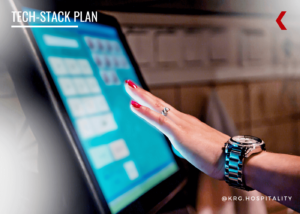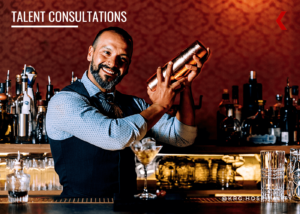Welcome: How to Begin the Guest Experience Like a Pro
by David Klemt

When you think about the guest experience you and your team deliver, how much consideration do you give the welcome?
I don’t mean just the greeting your front-of-house team gives guests. That’s an important part of the equation, but it’s only one element.
Rather, I’m talking about developing SOPs for welcoming guests into your venue. As importantly, I’m also suggesting that you develop specific onboarding and training for anyone who will greet guests and lead them to their seats.
Luckily, one of the best front-of-house trainers in hospitality spoke at the 2024 Flyover Conference in Cincinnati about this topic. Bethany Lucas, director of operations for Maverick Theory, shared her best tips for starting—and ending—the guest experience in a memorable way.
The tips Lucas shared during her Flyover session “Untapped Potential: How to Transform Your Front of House” will indeed transform your business and guest experience.
Now, a word of warning before I begin. Once you read these tips, you’ll likely find yourself analyzing your next few restaurant visits. Ever since sitting in on Lucas’ session, I’ve been unable to avoid paying more attention to how my restaurant visits have begun.
This has included sharing what I’ve noticed with the people in my group. Some of these friends will also pay more attention to the greeting they receive when walking into a restaurant now.
If you’re an operator or front-of-house leader, you’ll probably benefit from checking out restaurants in your area for their welcome procedures.
Invest in Your Door
Operators need to invest in their doors, because “it really is the brain of your restaurant,” says Lucas.
Therefore, it’s crucial that owners and operators understand what’s going on at their doors. Assuming your front-of-house team knows how to greet guests rather than training them on a procedure is a mistake.
Most operators know that hiring the right leaders, kitchen team, servers, and bartenders is imperative to the success of their business. However, the same attention must be paid to finding the right hosts and hostesses.
As Lucas says, “There is no ‘just a hostess.'” Bluntly put, the person running the door is the gatekeeper of the business. They’ll interact with just about every single guest since they serve as the first touchpoint.
So, Lucas encourages operators to ask a number of questions before initiating the hiring process:
- Are the ideal candidates formal and proper, or friendly and casual? (Or something else entirely.)
- Will the ideal hosts and hostesses need to be thick-skinned?
- When considering the appearance of the host team, what does that look like to you? Lucas seeks out people who are polished and professional when building her teams.
These questions should inspire even more considerations, helping an operator identify who they want to run their door.
Welcome
During her presentation, Lucas provided an example of a less-than-ideal welcome. I think we’ve all experienced what she described.
How often have each of us walked into a restaurant, been greeted, and then led to a table by someone who just takes off? The host or hostess grabs menus, starts walking away toward a table, doesn’t speak to you, and doesn’t even look over their shoulder to see if you’re still following them closely.
I know it’s happened to me more times than I can count. Although, I’m happy to report that this hasn’t happened to me since attending Flyover. Maybe what Lucas put out into the world has had a greater impact than she expected.
A polished and professional host or hostess, per Lucas, will not take off when leading guests to their seats. Additionally, they won’t be silent, failing to engage with the guest verbally. Further, a polished, professional host or hostess doesn’t drop menus on a table and rush back to the door.
In fact, Lucas requires each member of her host teams to ask at least one question of guests being led to their seats. This can be as simple, she explained at Flyover, as the host or hostess turning and asking “How are you today?”
It’s important to note that this attention to the door team isn’t reserved for upscale or fine-dining venues. The beginning and end of a guest’s visit are too important to fail to plan them properly. Regardless of concept and category of venue, guests must feel welcome and valued.
Farewell
According to Lucas, the farewell can absolutely impact how a guest perceives their visit, and the brand overall. While the server or bartender who served the guest should thank them at the end of their visit, so should the person who first welcomed them.
A simple “thank you for visiting us” can go a long way and serve as a cherry on top of the entire experience.
However, there’s another tip Lucas shared that has really stuck with me. A truly a savvy host team will add a question after they thank a guest for their visit: “Can I make a reservation for you for your next visit?”
Doing so requires the ability to read a guest and their satisfaction with their visit. However, if executed well this is a brilliant way to increase your guest retention rate and convert a first-time guest into a repeat guest, and eventually a regular.
If you’ve read this far, I encourage you to consider your welcome SOPs and door team today. You and leadership team should observe the door and note how guests are being welcomed.
If the procedure doesn’t impress you, it’s not impressing your guests. And if it isn’t impressing your guests, ask yourself why they’d return.
Your door isn’t “just a door,” and your hosts aren’t “just hosts.” Remember that, and plan accordingly.
Image: Shutterstock. Disclaimer: This image was generated by an Artificial Intelligence (AI) system.











